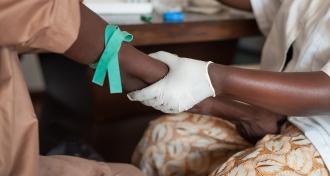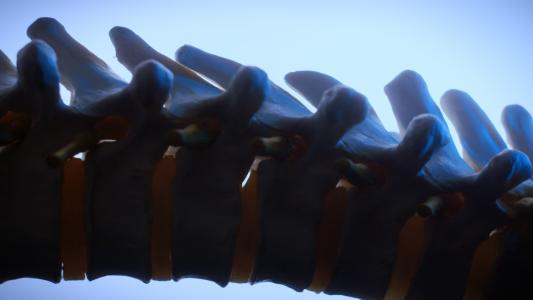The Ebola outbreak in the northeastern provinces of the Democratic Republic of the Congo continues to rage. It is now the second deadliest outbreak on record, behind only the West African outbreak in 2014. The epicenter is in North Kivu, a conflict-torn province which shares borders with Rwanda and Uganda.
In June, a small number of Ugandan Ebola cases were the first to cross borders from the current Congo outbreak. The country will now play host a massive trial study of a new Ebola vaccine.
A New Weapon in the War on Ebola
A vaccine made by American pharmaceutical company Merck is already being used in Congo, with promising results. The vaccine is being used in outbreak control, in a method known as “ring vaccination.”
Ring vaccination works by encircling and cutting of the virus’s path of transmission; think firefighters clearing brush ahead of a wildfire to rob it of fuel. When a confirmed case of Ebola is found, epidemiologists trace whoever came into contact with that person.The people who contacted the Ebola patient (and then those who contacted them) are vaccinated in expanding rings until the virus is stopped in its tracks.
As confirmed cases continue to swell and the situation risks spiraling even further out of control, the World Health Organization (WHO) has made Merck’s vaccine available to ever broader circles. This comes with a catch, however: there is a finite supply of the Merck vaccine, and making more takes money and time. Congolese officials are also opposed to field testing another vaccine, concerned that it would complicate the outbreak response.
Enter Uganda
The Uganda trial will be testing a two-step vaccine — known as a “prime-boost” vaccine — made by Janssen Vaccines and Prevention. The first dose “primes” the immune system with antigen DNA; the second one, given 56 days later, “boosts” it with more antigen protein. Because it uses multiple methods to stimulate production of antibodies, it is thought to be more effective than traditional vaccination strategies.
According to the London School of Hygiene and Tropical Medicine (LSHTM), which is sponsoring the study, scientists will attempt to vaccinate 800 health workers and frontline responders — burial teams, ambulance drivers, cleaners — who are most at risk of becoming infected. These subjects will be studied for two years to determine how well the vaccine protects against Ebola and how long that protection lasts.
If the vaccine proves not only effective but long-lasting, it could take the pressure off using only one source of vaccine and be more effective in closing the rings.
Information will also be gathered about the attitudes and perceptions towards the vaccines. This social study will be crucial for saving lives.
The Cold Water
Vaccines and antivirals are already working well in the DRC, but outbreak response has been whipsawed by the various armed groups active in the region and the mistrust and anger some have directed at healthcare workers.
North Kivu has long been unstable, host to an alphabet soup of bad actors that have in turn fostered the growth of powerful local protection militias, known by the catch-all name Mai-Mai. Such is the power of the Mai-Mai that even Congolese national forces do not enter their territory.
When Ebola is traced to a place of Mai-Mai control, responders must be able to negotiate with their generals. Doing so correctly not only makes the response safer but more effective; the general has the power to ensure his whole village follows safe Ebola protocols and gets vaccinated.
But years of corruption and violence makes trusting the responders, who take away their loved ones, deny families the funeral rites their deceased require, and appear ghoulish in their masked protective equipment, difficult. Ebola treatment centers have been attacked and burned, and healthcare workers are sometimes kidnapped and even killed.
Getting the vaccine to the people who need it in these conditions remains the greatest challenge; even if the Ugandan vaccine proves highly effective, that means little if it cannot be used. Ultimately, the data gathered in Uganda about perceptions and attitudes towards the vaccines may prove to be the most important part of the study.
Ed. note: This piece has been updated from an earlier draft.






